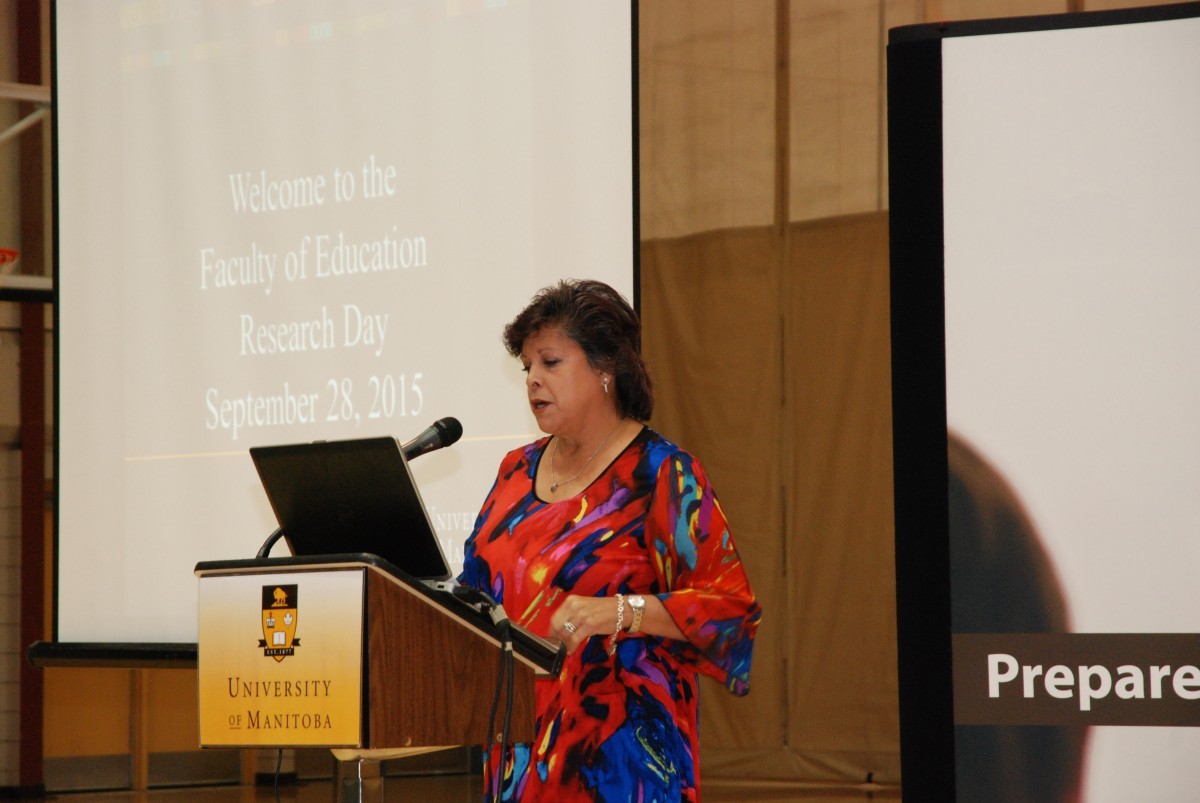
Cynthia Wesley-Esquimaux, vice-provost (Aboriginal initiatives) at Lakehead University in Thunder Bay, Ont., gave an inspiring keynote speech to about 420 B.Ed. students during Faculty Research Day.
Creative thinking, innovative research the key to change for Indigenous people, students told
Spend time in remote communities and learn about traditional ways, says keynote speaker at Faculty Research Day.
Be part of the solution to improve the situation for Indigenous students and peoples, keynote speaker Cynthia Wesley-Esquimaux told Bachelor of Education students during her speech at Faculty Research Day.
Aboriginals already know about the challenges they are living with on a daily basis, Wesley-Esquimaux, vice-provost (Aboriginal initiatives) at Lakehead University in Thunder Bay, Ont., told students at the second annual Faculty Research Day held Sept. 28. Instead, she urged B.Ed. students attending the event to develop ideas to make positive change, both within and outside their classrooms. Faculty Research Day was created to showcase the research and scholarly activities of faculty members, graduate students and Undergraduate Research Award recipients.
Wesley-Esquimaux also encouraged students to take the opportunity to get involved in remote or rural Aboriginal communities in order to learn about the lives of the inhabitants firsthand.
“You have to learn to speak human. Learn to speak with your heart and not your head.”
She noted that many of the people in those communities are practicing what she calls “survivance”—but are also more than happy to welcome people to their community to teach them about traditional ways.
Wesley-Esquimaux noted that students who decide to spend time doing research or teaching in remote communities will find that while they will influence the lives of their students, “ they [the residents of the communities] will deeply, deeply influence yours.”
Wesley-Esquimaux told a little of her own story as well. Born in Toronto, she is the child of two residential school survivors—the ramifications of which had a huge impact on both her parents. As a child, she encountered sexual violence, alcohol abuse and abandonment. And in other households of Aboriginals she knew, it was “the same story.”
But living in such a multicultural city, she found that she also met people from other backgrounds who had very different home lives. So, said Wesley-Esquimaux, even as a child she realized that something had happened to Indigenous people to incur this suffering. She set out to find out what that was. At 16 she dropped out of school and at 20 she moved to southern California, where she discovered that Aboriginal people were treated differently than they were in Canada. She began to embark on a journey of self-discovery and began her academic career. She finished her high school and went to the College of the Desert. She returned to Canada for even more schooling and ultimately got her PhD in social cultural anthropology from the University of Toronto.
Leaving home was one of the life lessons Wesley-Esquimaux wanted to impress upon the B.Ed. students on Research Day.
“I encourage people to leave this place and go somewhere else.” Most people who have, she said, have “done incredible things.”
Her travels led her to one of her research areas, which is focused on understanding the transmission of historic and intergenerational trauma and unresolved grief, particularly within the Aboriginal community. Part of that is the transmission of grief from those who were victims of the residential school system.
Make research count
Wesley-Esquimaux said that academia is one of the ways to turn things around and challenged students to help create change by taking action.
“We’re tired of hearing how bad it is, how poor we are. We don’t need to research that anymore. What we need to do is, ‘How do we change that?’
“It’s necessary to be innovative and to find other ways of doing things.”
Students can also be part of the solution by being a mentor to Aboriginal youth, she said. Wesley-Esquimaux asked teacher candidates to reach out, to take a child for lunch, to talk to them and show them that there are many opportunities in the world. Tell them that you went to college and that it is a possibility for them, too, she said.
“Be human to other humans and you will be surprised at how much it helps your research.”
The keynote speaker also asked students to take their research to where it will begin to benefit the most people and not to wait for things to begin—“Make it happen.”
Wesley-Esquimaux also said that before embarking on any research, teacher candidates should ask themselves, “What is the value of the research you are doing?”
And she again encouraged them to be part of the change—showing a video in which she tried to ride a dogsled in a northern community—and fell off. Jump on anyway, she told the students.
“You’ve got to get on the dogsled. You’ve got to be part of the change you want to see.”
Research at the University of Manitoba is partially supported by funding from the Government of Canada Research Support Fund.






